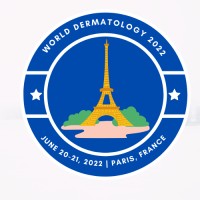Bo bin Cha
Sungkyunkwan University, South Korea
Title: Therapeutic Endpoint Determination using Dermoscopy in Pyogenic Granuloma Treatment with Long-pulsed Laser
Biography
Biography: Bo bin Cha
Abstract
Pyogenic granuloma (PG), the most common benign vascular tumor, does not involute spontaneously. Thus, several long-pulsed (LP) lasers can be an effective treatment option. While the treatment parameters used for common LP lasers are well-known, the objective therapeutic endpoints associated with LP laser therapy in PG has not yet been established. Thus, we tried to specify several dermoscopic features which help clinicians determining the therapeutic endpoint.
A 56-year-old male presented with an easily bleeding, 6 × 3 mm sized, reddish pyogenic granuloma located on the volar side of the left 4th finger. The lesion was treated with a pulsed-dye laser (PDL) using the following parameters: 7-mm spot size, 2–6-millisecond pulse duration, and radiant exposure of 7–9 J/cm2 with level 1 air cooling. Immediately after PDL, several changes in the dermoscopic structures of PG were observed. Post-laser dermoscopic patterns were composed of newly-emerged dusky violaceous homogenous areas, increased whitish homogenous areas, and focal crusted rupture. Similar findings were detected with other patients who were treated identically for their PG lesions.
As the patient could reach the termination of the treatment, we report the described dermoscopic changes as the therapeutic endpoints of pyogenic granuloma treated with LP laser.

